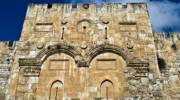The Torah teaches us that even when someone has done something terrible, we must still treat them with respect and consideration while showing them the error of their ways.
By: Rabbi Ari Enkin, Rabbinic Director, United with Israel
This week’s Torah portion is “Devarim” (Deuteronomy 1:1 – 3:22), and with it, we begin the fifth and final book of the Torah. The book of Deuteronomy in general, and this week’s Torah portion in particular, is essentially Moses’ final sermon to the people before he dies. It is a combination of history, rebuke, inspiration, and advice to the Jewish people as they ready themselves to enter the Promised Land.
Moses opens his sermon of rebuke with a review of the many places that the Jewish people encamped during their forty years of wandering in the desert. What is noted, however, is that some of the places that Moses refers to in his sermon don’t exist! There is no record of such places ever existing and certainly no record of the Jewish people ever encamping in such places! What’s going on here? What are these place names that Moses is referring to?
The sages explain that Moses replaced the true names of the places that the Jewish people encamped in with words that represent an event or experience that they had at these places.
For example, Moses refers to a place the Jewish people visited called “Di Zahav.” Although the Jewish people never visited a “Di Zahav” the words “Di Zahav” mean “Lots of Gold” which is an allusion to the sin of the Golden Calf.
Another place Moses mentions is “Laban” which again, does not exist. But “Laban” means “white” referring to the place where they received (and complained!) about the Manna, which was white! Moses’ tactic was to remind the people of their sins in an indirect way so as not to embarrass them.
From here we learn the importance of rebuking others in a gentle manner. Moses didn’t say “You lousy sinners who made the Golden Calf.” Instead, he said “There was a place that seems to remind me of gold.”
Thus, we learn to be careful not to embarrass or hurt anyone, even sinners.
This Sunday we will be observing Tisha B’Av, the day that commemorates the destruction of the two Holy Temples. Our sages teach us that one of the reasons that the Jewish people of that era deserved the destruction was because they did not respect, tolerate, or get along with one another. This week’s Torah portion, as well as Tisha B’Av, is a good time to reflect on our character traits and make an effort to become better people.
For more insights by Rabbi Enkin on this week’s Torah portion, click on the links below.
https://unitedwithisrael.org/unity-will-bring-redemption/
https://unitedwithisrael.org/living-torah-bribery-vs-gratitude/
https://unitedwithisrael.org/some-mistakes-could-become-valuable-life-lessons/
https://unitedwithisrael.org/the-greatness-of-you/
https://unitedwithisrael.org/living-torah-a-nation-of-leaders/
Do You Love Israel? Make a Donation - Show Your Support!
Donate to vital charities that help protect Israeli citizens and inspire millions around the world to support Israel too!
Now more than ever, Israel needs your help to fight and win the war -- including on the battlefield of public opinion.
Antisemitism, anti-Israel bias and boycotts are out of control. Israel's enemies are inciting terror and violence against innocent Israelis and Jews around the world. Help us fight back!























